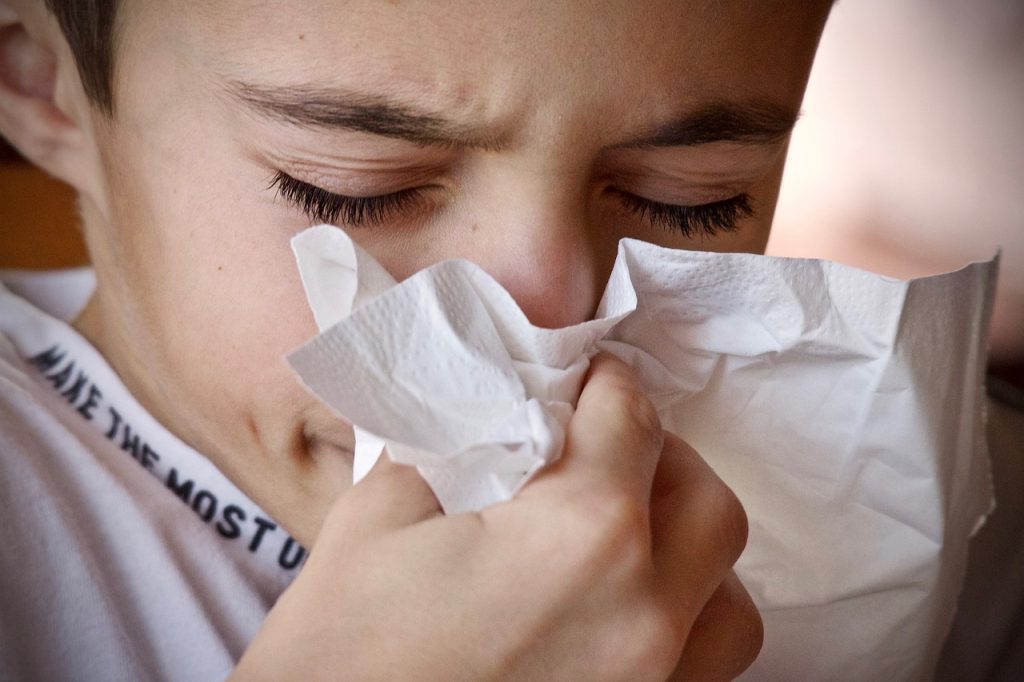Allergies are a common condition that affect millions of people worldwide. They occur when the immune system mistakenly identifies a harmless substance, such as pollen or pet dander, as a threat. The immune system then produces antibodies to fight off the supposed invader, leading to a variety of symptoms such as sneezing, itching, and congestion. So, read on to find out how to effectively treat allergies starting with one of the most common ones.
Seasonal Allergies

Seasonal allergies are a common problem for many people. They occur when the immune system reacts to certain types of pollen, usually from trees, grasses, and weeds, as if they were harmful invaders. As a result, the body releases chemicals, such as histamine, that cause inflammation in the nose and eyes, resulting in a variety of symptoms.
Symptoms of seasonal allergies include sneezing, runny nose, itchy eyes, and nasal congestion. These symptoms can be very bothersome and can make it difficult to go about daily activities. They can also lead to other problems, such as sinus infections, ear infections, and asthma. For some people, the symptoms can be severe enough to interfere with sleep and work.
The cause is an overactive immune system. When a person with allergies is exposed to an allergen, such as pollen, their immune system mistakenly recognizes it as harmful and releases chemicals to fight it off. These chemicals cause inflammation and other symptoms.
Common Treatments
There are several ways to effectively treat allergies when it comes to the seasonal variety. Over-the-counter and prescription medications, such as antihistamines and nasal sprays, can help to relieve symptoms. Immunotherapy, also known as allergy shots, can also be effective. This treatment involves gradually exposing the person to increasing amounts of the allergen to build up tolerance.
The best way, but not always the most convenient one, to manage seasonal allergies is to avoid exposure to allergens. This means staying indoors on days when the pollen count is high, keeping windows closed, and using air conditioning. Wearing a mask when going outside can also be helpful.
Seasonal allergies are a common problem that can cause a variety of annoying symptoms at the very least. Treatment options include medications, immunotherapy and avoiding exposure to allergens. With appropriate treatment, people with this annoying affliction can manage their symptoms and improve their quality of life.
Food Allergies

Food allergies, on the other hand, can occur at any time and can be triggered by a wide range of foods, including peanuts, shellfish, and eggs. Allergic reactions to medication can also occur, and can range from mild skin rashes to severe and life-threatening reactions such as anaphylaxis.
Food allergies are a growing concern in today’s society, affecting millions of individuals worldwide. As with many other types of allergies, food allergies occur when the body’s immune system mistakenly identifies a specific food protein as harmful and produces an immune response to it.
There are several common types of food allergies, including those to peanuts, tree nuts, fish, shellfish, milk, eggs, soy, and wheat. They can range from mild to severe, and can cause symptoms such as hives, itching, swelling, difficulty breathing, and even anaphylaxis, a potentially life-threatening condition.
The cause of food allergies is not entirely understood, but research suggests that a combination of genetic and environmental factors may play a role. Some studies have shown that children who have a family history of allergies, eczema, or asthma are more likely to develop food allergies. Additionally, exposure to certain foods at a young age, such as peanuts, may increase the risk of developing an allergy to them.
Diagnosis of food allergies typically involves a combination of a physical examination, a review of the individual’s medical history, and various tests, such as skin prick tests and blood tests.
How to Effectively Treat Allergies for Food
Once diagnosed, the best course of treatment is to avoid the allergen. This can be difficult, as many food products contain hidden ingredients, and accidental exposure can occur.
In addition to avoiding the allergen, individuals may need to carry an epinephrine auto-injector, which can be used in case of a severe allergic reaction. They may also need to be extra vigilant when eating out at restaurants or when consuming packaged foods, as cross-contamination can occur during food preparation.
Fortunately, in recent years, there have been advances in research for the treatment of food allergies. One promising area of research is oral immunotherapy, where small amounts of the allergen are gradually introduced to the individual over time. This can help desensitise the immune system and reduce the severity of an allergic reaction.
Sadly, food allergies are a serious health concern that affects millions of people worldwide. They can range from mild to severe and can be difficult to manage. While there is no cure, avoiding the allergen, carrying an epinephrine auto-injector and new treatment options like oral immunotherapy can help individuals with food allergies to manage their condition. It’s important for everyone to be aware of them, and take them seriously to ensure the safety of those affected.
Medicinal Allergies

Drug allergies are a common issue that affects many people. These reactions can range from mild to severe and can even be life-threatening. It is important for individuals to be aware of the symptoms of a drug allergy and to inform their healthcare provider if they suspect they have one.
The most common symptoms of a drug allergy include hives, rash, itching, and difficulty breathing. These symptoms can appear within a few minutes to an hour after taking the medication. In some cases, a drug allergy can cause a more severe reaction, such as anaphylaxis, which is a potentially life-threatening reaction that can cause swelling of the airways and drops in blood pressure.
Drug allergies can occur with any type of medication, including over-the-counter drugs and prescription medications. However, some medications are more likely to cause an allergic reaction than others. For example, we know antibiotics, such as penicillin, cause allergic reactions in some individuals. Other medications, such as sulfa drugs, also cause allergic reactions Sulfa drugs treat bacterial infections, and non-steroidal anti-inflammatory drugs, such as aspirin and ibuprofen.
Different Types of Drug Allergies
There are several different types of drug allergies, including immediate, delayed, and pseudoallergies.
- Immediate:- occur within minutes to hours after taking the medication and are the most common type of drug allergy.
- Delayed:- occur a few days to weeks after taking the medication.
- Pseudoallergies are not true allergies, but rather a reaction to a medication that mimics an allergic reaction.
If you suspect you have a drug allergy, it is important to inform your healthcare provider. They may ask about your symptoms, the medications you are taking, and any other medical conditions you have. They may also perform a skin test or a blood test to help determine if you have a drug allergy.
If you have a drug allergy, your healthcare provider will likely recommend that you avoid the medication that caused the reaction. They may also prescribe an alternative medication to treat your condition. In some cases, individuals with drug allergies may require desensitisation, which is a process that gradually exposes the individual to the medication in increasing amounts to help build tolerance to the medication.
Drug allergies are a common issue that affects many people. These reactions can range from mild to severe and can even be life-threatening. It is important for individuals to be aware of the symptoms of a drug allergy and to inform their healthcare provider if they suspect they have one. With the right treatment, most people with drug allergies can continue to take the medications they need to stay healthy.
Symptoms of Allergies

Allergies are a common condition that can cause a wide range of symptoms. These symptoms can vary depending on the type of allergy and the severity of the reaction.
Most common symptoms of allergies
- Sneezing:- one of the most common symptoms of allergies. This is caused by the release of histamine, a chemical that is produced by the body in response to an allergen. Sneezing is a reflex that helps to clear the nasal passages of irritants and mucus.
- Runny noses:- caused by the inflammation of the nasal passages, which leads to an increase in mucus production. This can make it difficult to breathe and can cause a feeling of congestion.
- Congestion:- caused by the inflammation of the nasal passages. Can make it difficult to breathe and can cause a feeling of pressure in the face. Congestion can also lead to a loss of smell and taste.
- Itchy eyes:- caused by the release of histamine, which causes the blood vessels in the eyes to dilate and become inflamed. This can cause redness, itching, and tearing of the eyes.
- Hives:- raised, itchy welts that can appear anywhere on the body. They can be a sign of a severe allergic reaction and should be treated promptly.
- Other symptoms:- coughing, wheezing, and difficulty breathing. These symptoms can occur as a result of the inflammation of the airways.
In addition to these common symptoms, allergies can also cause a range of other symptoms including headaches, fatigue, and eczema. Some people may also experience a rapid heartbeat, lightheadedness, or fainting.
Overall, allergies can cause a wide range of symptoms, and the severity of the symptoms can vary greatly from person to person. If you suspect that you have an allergy, it is important to see a healthcare professional for an accurate diagnosis and treatment plan.
How to Effectively Treat Allergies After Diagnosis

Allergies are typically diagnosed through a combination of medical history, physical examination, and allergy testing. Allergy testing can include skin tests, blood tests, and patch tests. Once an allergy has been diagnosed, treatment options include avoiding the allergen, using over-the-counter or prescription medications, and in some cases, immunotherapy.
Other ways to effectively treat allergies are over-the-counter and prescription medications. Antihistamines, decongestants, and nasal sprays are some common medications for symptoms of allergies. Another type of treatment is immunotherapy or allergy shots, which work well for some types of allergies. This treatment involves injecting small amounts of the allergen into the body over time to help the immune system build up a tolerance to the substance.
For more severe allergies, medical professionals often presecribe medications such as nasal corticosteroids and leukotriene modifiers. These medications work to reduce inflammation and prevent the release of histamine in the body.
Allergy shots, also known as immunotherapy, are another treatment option for certain types of allergies. This treatment involves receiving a series of shots that contain small amounts of the allergen. Over time, the immune system becomes less sensitive to the allergen, reducing the severity of allergic reactions.
It’s important to note that allergies can also be a symptom of underlying conditions such as asthma, and in those cases, treatment may also include medication to control these conditions.
Wrapping Up How to Effectively Treat Allergies
In conclusion, allergies are a common condition that affects millions of people worldwide. They can cause a variety of symptoms and can be triggered by a wide range of substances. Allergies can be diagnosed through a combination of medical history, physical examination, and allergy testing. There are a few ways to effectively treat allergies include avoiding the allergen, using over-the-counter or prescription medications, and in some cases, immunotherapy. And if you want to know more about allergies, head over here.
Read More
- What Are The Benefits of Vaping Over Smoking?
- Boosting Your Immune System Means Living Your Best Life
- Why Fighting Chronic Stress Is Everybody’s Fight
- Drinking and Driving, and How to Avoid Stupidity
- The Negative Effects of Caffeine on Your Body and Mind
Disclaimer: The information provided on Healthy Lifestyles for All is intended for general educational purposes only and should not be considered as medical advice. Please consult with your GP or other health professional before making any significant changes to your diet, exercise routine, or any other aspect of your lifestyle. We are not responsible for any adverse effects or consequences resulting from the use of the information provided on our blog.
Comments: I hope you enjoyed reading this post as much as I enjoyed writing it. If you liked it, please leave a comment. If you didn’t like it, disagree with something I have written (I’m okay with that), or think I got something wrong (that’s okay too), please leave a comment as well. We only truly learn from our mistakes, so I am happy to have mine pointed out.
Affiliate Links: Please also note that I may make a small amount of money if you buy one of the products I recommend in any of my blog posts. Rest assured that I have done my own due diligence, and only recommend products that have been tried and tested, and have extremely good feedback. Additionally, many of the products I recommend have 30 or 60-day money-back guarantees, so you can buy in the confidence that if a particular product is not right for you, you can get a refund.

